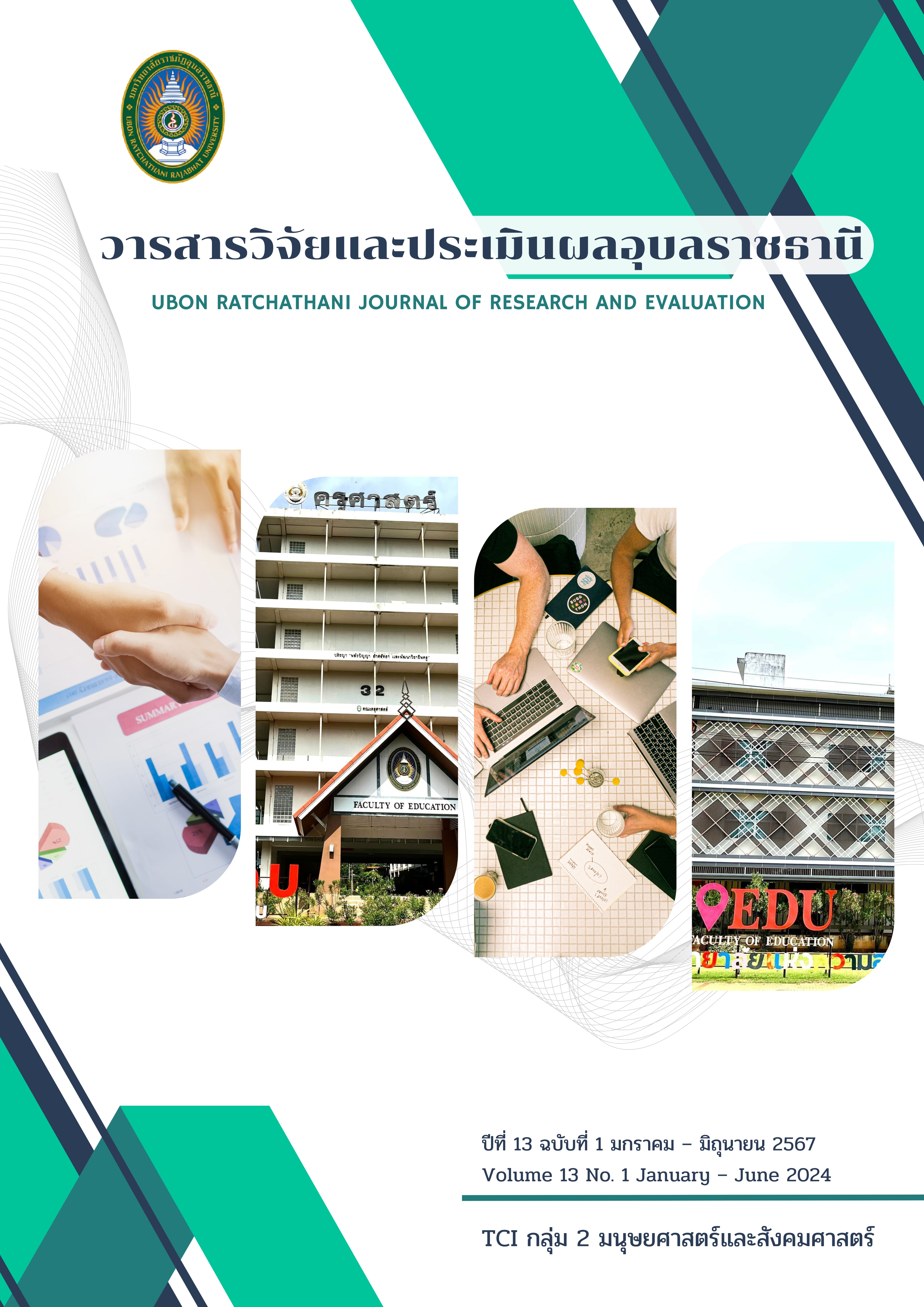การพัฒนาทักษะการแก้ปัญหาทางคณิตศาสตร์โดยใช้การจัดการเรียนรู้เชิงประสบการณ์สำหรับนักเรียนชั้นประถมศึกษาปีที่ 5 สำนักงานเขตพื้นที่การศึกษาประถมศึกษาอุบลราชธานี เขต 3
คำสำคัญ:
ทักษะการแก้ปัญหา การเรียนรู้เชิงประสบการณ์ วิจัยเชิงปฏิบัติการบทคัดย่อ
การวิจัยครั้งนี้มีวัตถุประสงค์เพื่อ 1) ศึกษาการพัฒนาทักษะการแก้ปัญหาทางคณิตศาสตร์โดยใช้การจัด
การเรียนรู้เชิงประสบการณ์ 2) เปรียบเทียบทักษะการแก้ปัญหาทางคณิตศาสตร์ก่อนและหลังการจัดการเรียนรู้เชิงประสบการณ์ และ 3) ศึกษาความพึงพอใจของนักเรียนที่มีต่อการจัดการเรียนรู้เชิงประสบการณ์ กลุ่มเป้าหมายที่ใช้ในการวิจัย ได้แก่ นักเรียนชั้นประถมศึกษาปีที่ 5/2 โรงเรียนบ้านอ่างหิน (เพียรพิทยาคาร) สังกัดสำนักงานเขตพื้นที่การศึกษาประถมศึกษาอุบลราชธานี เขต 3 ภาคเรียนที่ 2 ปีการศึกษา 2562 ได้มาจากวิธีการเลือกแบบเจาะจง จำนวน 29 คน รูปแบบการวิจัยใช้เทคนิคการวิจัยปฏิบัติการตามแนวคิดของ Lewin เครื่องมือที่ใช้ในการวิจัย ได้แก่ 1) แผนการจัดการเรียนรู้โดยใช้การจัดการเรียนรู้เชิงประสบการณ์ 2) แบบทดสอบวัดทักษะการแก้ปัญหาทางคณิตศาสตร์ และ 3) แบบประเมินความพึงพอใจของนักเรียนที่มีต่อการจัดการเรียนรู้เชิงประสบการณ์ สถิติที่ใช้ในการวิเคราะห์ข้อมูล ได้แก่ ความถี่ ร้อยละ ค่าเฉลี่ย ส่วนเบี่ยงเบนมาตรฐาน และทดสอบสมมติฐาน โดยใช้ Wilcoxon Sign Ranks Test
ผลการวิจัยพบว่า
- การพัฒนาทักษะการแก้ปัญหาทางคณิตศาสตร์ โดยใช้การจัดการเรียนรู้เชิงประสบการณ์ ผลการปฏิบัติการ พบว่า จากการนำกระบวนการวิจัยปฏิบัติการมาใช้ในการพัฒนาทักษะการแก้ปัญหาทางคณิตศาสตร์โดยใช้การจัด
การเรียนรู้เชิงประสบการณ์มีลักษณะบันไดเวียนกระทำซ้ำ 3 วงจรปฏิบัติการ นักเรียนมีทักษะการแก้ปัญหาทางคณิตศาสตร์ เฉลี่ยร้อยละ 83.20 นักเรียนทุกคนผ่านเกณฑ์ร้อยละ70 และนักเรียนจำนวน 29 คน ผ่านเกณฑ์ร้อยละ 100 ตามเกณฑ์ที่กำหนด - นักเรียนมีทักษะการแก้ปัญหาทางคณิตศาสตร์หลังปฏิบัติการโดยใช้การจัดการเรียนรู้เชิงประสบการณ์สูงกว่าก่อนปฏิบัติการอย่างมีนัยสำคัญทางสถิติที่ระดับ .05
- นักเรียนมีความพึงพอใจต่อการจัดการเรียนรู้เชิงประสบการณ์ โดยภาพรวมอยู่ในระดับพึงพอใจมากที่สุด ( = 4.57, S = .50)
ดาวน์โหลด
เผยแพร่แล้ว
รูปแบบการอ้างอิง
ฉบับ
ประเภทบทความ
สัญญาอนุญาต
ลิขสิทธิ์ (c) 2024 วิจัยและประเมินผลอุบลราชธานี

อนุญาตภายใต้เงื่อนไข Creative Commons Attribution-NonCommercial-NoDerivatives 4.0 International License.
1. บทความที่ตีพิมพ์ในวารสารนี้ได้มีการตรวจสอบการลอกเลียนงานวรรณกรรมแล้ว ไม่เกินร้อยละ 25
2. บทความที่ตีพิมพ์ในวารสารนี้เป็นข้อคิดเห็น ข้อค้นพบของผู้เขียนบทความ โดยผู้เขียนบทความต้องเป็นผู้รับผิดชอบต่อผลทางกฎหมายใด ๆ ที่อาจเกิดขึ้นจากบทความนั้น ๆ
3. บทความ ข้อมูล เนื้อหา รูปภาพ ฯลฯ ที่ได้รับการตีพิมพ์ในวารสารวิจัยและประเมินผลอุบลราชธานี ถือเป็นลิขสิทธิ์ของวารสารวิจัยและประเมินผลอุบลราชธานี หากบุคคลหรือหน่วยงานใดต้องการนำทั้งหมดไปเผยแพร่ต่อหรือเพื่อกระทำการใดๆ จะต้องได้รับอนุญาตเป็นลายลักษณ์อักษรจากวารสารวิจัยและประเมินผลอุบลราชธานีก่อนเท่านั้น และจะต้องมีการอ้างอิงวารสารวิจัยและประเมินผลอุบลราชธานี ฉบับนั้น ๆ ด้วย






